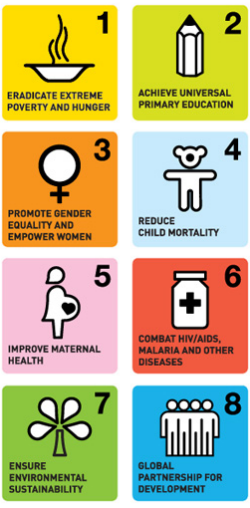MDGs final progress report
The Millennium Development Goals (MDG) have produced the "most successful anti-poverty movement in history", according to the final MDG report issued this week.
 The MDGs are eight targets to reduce global poverty and improve living standards. The Millennium Development Goals Report 2015 found that the 15-year effort to achieve the eight aspirational goals set out in the Millennium Declaration in 2000 was “largely successful across the globe, while acknowledging shortfalls that remain."
The MDGs are eight targets to reduce global poverty and improve living standards. The Millennium Development Goals Report 2015 found that the 15-year effort to achieve the eight aspirational goals set out in the Millennium Declaration in 2000 was “largely successful across the globe, while acknowledging shortfalls that remain."
The data and analysis presented in the report show that with targeted interventions, sound strategies, adequate resources and political will, "even the poorest can make progress".
Two decades ago, nearly half of the developing world lived in extreme poverty. The number of people now living in extreme poverty has declined by more than half, falling from 1.9 billion in 1990 to 836 million in 2015.
The world has also witnessed dramatic improvement in gender equality in schooling since the MDGs, and gender parity in primary school has been achieved in the majority of countries.
“Following profound and consistent gains, we now know that extreme poverty can be eradicated within one more generation”, said UN General Secretary Ban Ki-moon. “The MDGs have greatly contributed to this progress and have taught us how governments, business and civil society can work together to achieve transformational breakthroughs”.
Nevertheless, inequalities persist, the report continued. It report highlighted that significant gains have been made for many of the MDG targets worldwide, but progress has been uneven across regions and countries, leaving significant gaps. Conflicts remain the biggest threat to human development, with fragile and conflict-affected countries typically experiencing the highest poverty rates.
World leaders have called for an ambitious long-term sustainability agenda to succeed the MDGs, the report continued.
Building on the momentum of the MDGs, new global goals will "break fresh ground" with ambition on inequalities, economic growth, decent jobs, cities and human settlements, industrialisation, energy, climate change, sustainable consumption and production, peace and justice.
“The emerging post-2015 development agenda, including the set of Sustainable Development Goals, strives to build on our successes and put all countries, together, firmly on track towards a more prosperous, sustainable and equitable world”, said Ban Ki-moon.
Commenting on the findings, global development charity Christian Aid said the progress reveals important lessons about what the global community can achieve when it recognises “a shared moral imperative and the need for common action”.
But it also highlights "the worsening crises" which remain, Toby Quantrill, the charity’s Principal Economic Justice Adviser said.
“The UN’s new report reveals progress across much of the world on some of the most critical targets that countries set for themselves fifteen years ago.
“That means better daily lives for many millions of people. Achievements such as increasing the numbers of girls in primary education, halting the spread of malaria and providing access to clean water will make a real difference to people’s daily lives.
“However it is also painfully clear that progress in other areas has been limited and some problems have got worse – for instance the climate crisis and widening inequality at every level, including that between women and men.
“Action on the MDGs has had little impact on these problems, some of which were less clear 15 years ago when the Goals first came into force. But now that they are alarmingly apparent, the time has come for more fundamental change.”
Baptist Times, 08/07/2015